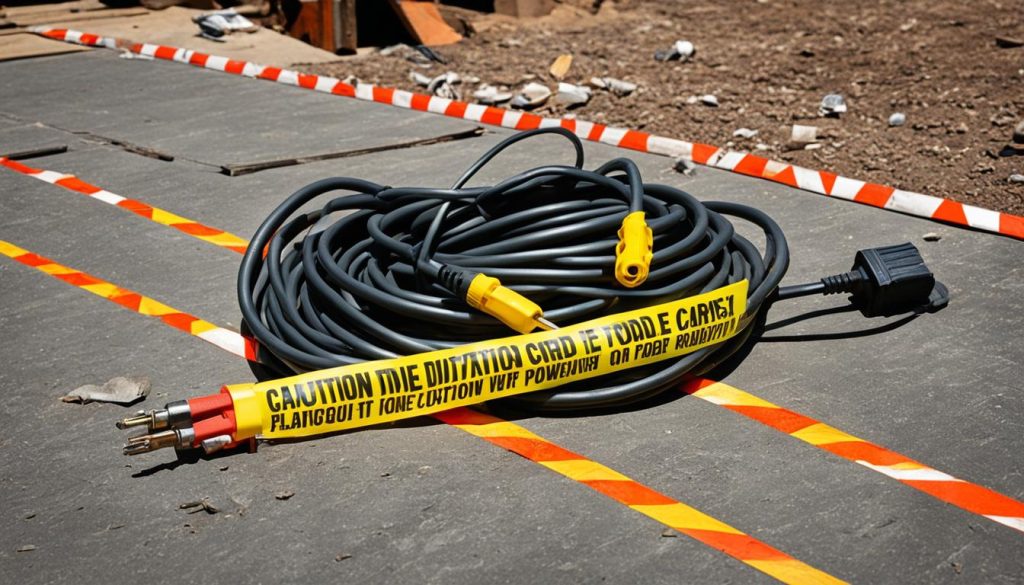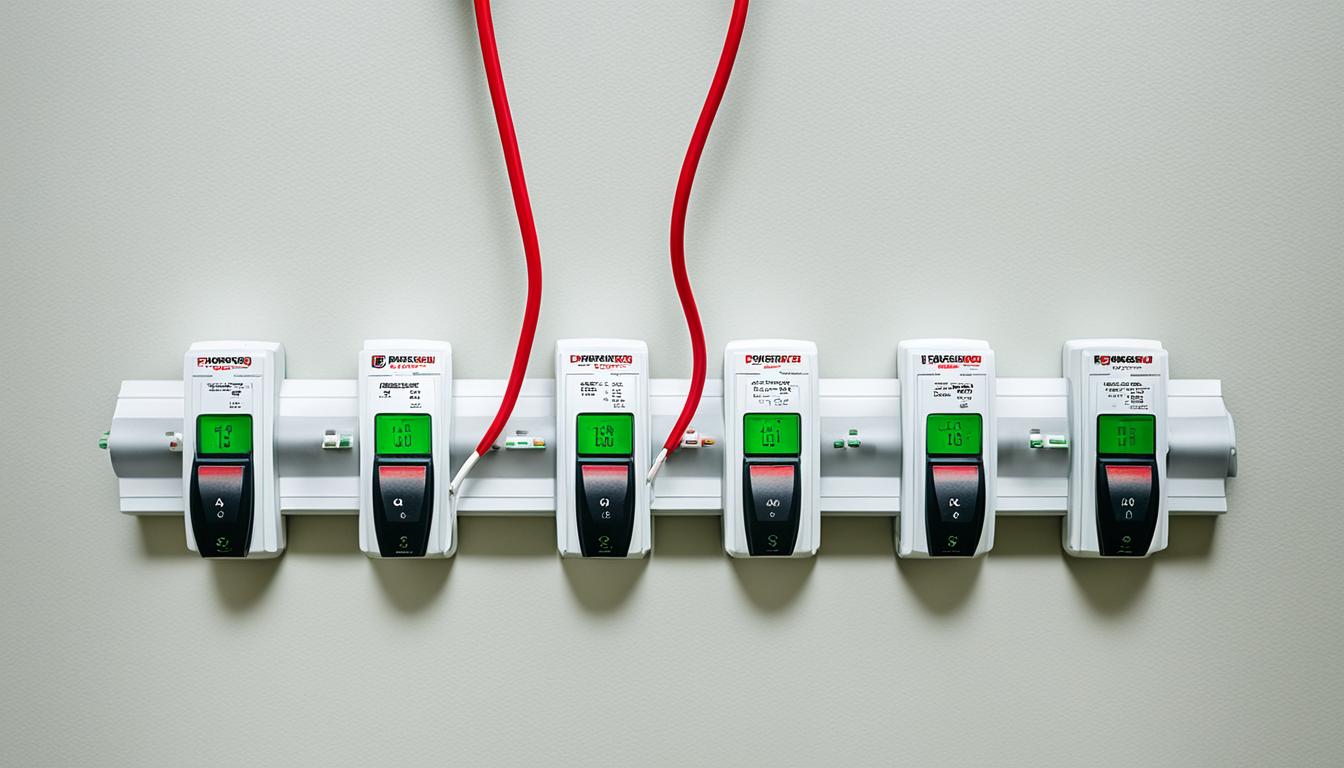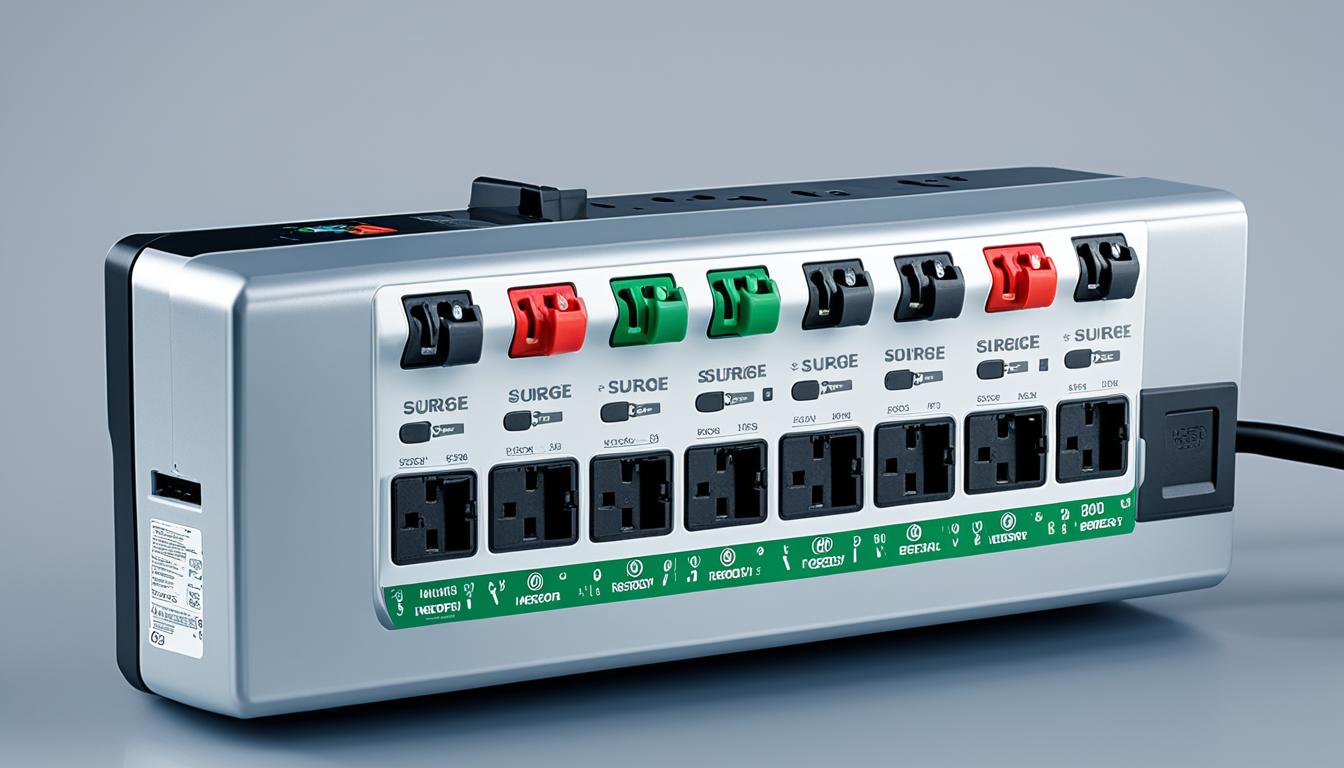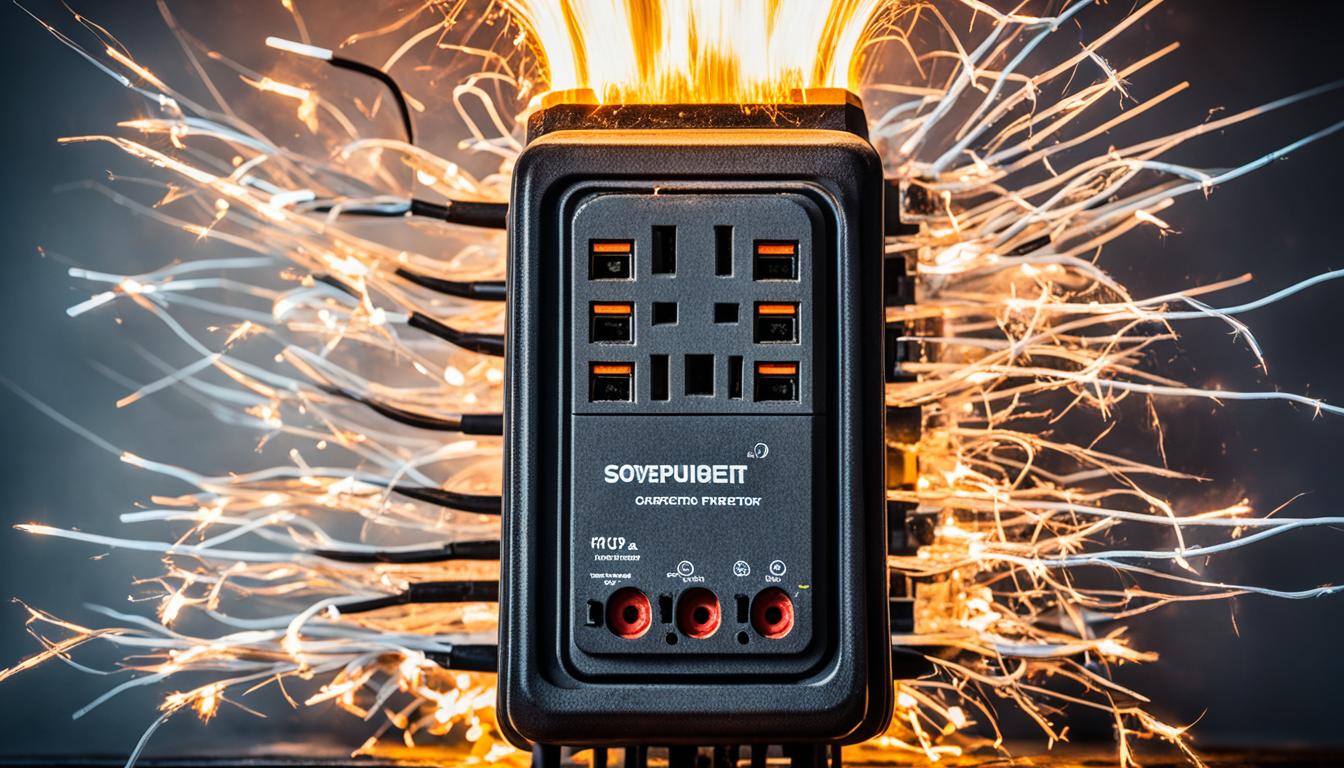Extension cords are an essential tool for powering small appliances, yard tools, and electronics that can’t reach the nearest electrical outlet. However, using the wrong extension cord or improper handling can pose serious hazards, leading to over 3,000 house fires each year. To ensure your electrical safety, it’s crucial to choose the right extension cord for each task.
When it comes to heavy-duty power needs, a 20 amp extension cord is your reliable solution. Designed to handle high amp requirements, these cords are built to withstand heavier loads and ensure a safe and reliable power supply. Whether you’re working with power tools, industrial equipment, or high-powered electronics, a 20 amp heavy-duty extension cord is your go-to choice.
Key Takeaways:
- Improper use of extension cords can lead to fire hazards, causing over 3,000 house fires annually.
- Choosing the correct extension cord depends on factors such as cord length, wire gauge, and amperage limits.
- A 20 amp heavy-duty extension cord is suitable for heavy-duty power needs.
- These cords are designed to handle high amp requirements, making them ideal for power tools, industrial equipment, and high-powered electronics.
- Selecting the right extension cord is essential for ensuring safety and reliable power supply.
How to Choose the Right Extension Cord
When it comes to selecting the perfect extension cord, several factors need to be taken into consideration. The length of the cord, wire gauge, amperage limits, and extension cord designations all play crucial roles in ensuring a safe and efficient power supply. Let’s explore each of these factors in detail.
Extension Cord Length
The length of the extension cord directly affects its electrical resistance. As the cord length increases, so does the resistance, resulting in a decrease in power delivery to your devices. To ensure optimal performance, it’s important to choose the appropriate cord length based on your specific needs and the distance from the power source to your devices. For shorter distances, a shorter cord may suffice, while longer distances may require a longer cord to maintain power efficiency.
Wire Gauge
The wire gauge of an extension cord determines its capacity to handle electrical current. The lower the gauge number, the thicker the wires are, allowing for higher power transmission. When selecting an extension cord, consider the power requirements of your devices and choose a cord with a wire gauge that can safely handle the load. It is crucial to match the wire gauge to the devices’ amperage to avoid overheating and potential hazards.
Amperage Limits
Understanding the amperage limits of both your devices and the extension cord is vital for proper functionality. The amperage rating of an extension cord should match or exceed the power requirements of the devices you intend to connect to it. Exceeding the amperage limit can cause overheating, potential damage to the devices, and even fire hazards. Always check the manufacturer’s recommendations for both your devices and the extension cord to ensure a safe and efficient power supply.
Extension Cord Designations
Extension cords come in various designations, each suited for specific purposes and environments. Familiarize yourself with these designations to make an informed decision:
- Indoor Use: These cords are specifically designed for use indoors and should not be exposed to moisture or harsh weather conditions.
- Outdoor Ratings: Outdoor-rated extension cords are designed to withstand exposure to moisture, extreme temperatures, and other outdoor elements.
- Insulation Types: Different extension cords have various insulation types, such as thermoplastic, vinyl, or rubber coatings. Understanding the insulation type is crucial for selecting a cord suitable for your specific needs.
- Construction Materials: Extension cords are constructed using different materials, such as copper or aluminum. Copper cords offer better conductivity and durability compared to aluminum cords.
By considering these factors and familiarizing yourself with extension cord designations, you can choose the right extension cord that matches your power requirements and ensures a safe and reliable power supply.
Important Dos and Don’ts of Using Extension Cords
When it comes to using extension cords, following safety guidelines is essential to prevent accidents and ensure proper operation. Here are some important dos and don’ts to keep in mind for extension cord safety:
Dos:
- Inspect cords for damage: Before using an extension cord, visually inspect it for any signs of wear, fraying, or exposed wires. Replace damaged cords immediately to avoid electrical hazards.
- Cover unused outlets: When using extension cords, make sure to cover any unused outlets with safety caps or outlet covers. This prevents accidental contact with live electrical parts.
- Purchase cords with safety certifications: Look for extension cords that have been tested and certified by trusted organizations such as UL (Underwriters Laboratories) or ETL (Intertek), ensuring they meet safety standards.
- Store cords properly: After use, store extension cords in a neat and organized manner, coiling them up without knots or tangles. This helps prevent damage and makes them easier to use in the future.
Don’ts:
- Use indoor cords outdoors: Indoor extension cords are not designed to withstand outdoor conditions. Avoid using them outside to prevent damage from moisture, extreme temperatures, or other environmental factors.
- Overload cords: Do not plug too many devices into a single extension cord as it can lead to overheating and electrical fires. Always check the ampere rating of the cord and make sure it can handle the combined power requirements of your devices.
- Use space heaters with extension cords: Space heaters draw a high amount of power and generate heat, which can overload extension cords. Plug space heaters directly into a wall outlet to avoid electrical hazards.
- Connect multiple cords together: Connecting multiple extension cords end-to-end, also known as daisy-chaining, is dangerous and increases the risk of electrical hazards. Instead, use a single, longer cord that meets your power requirements.
By following these dos and don’ts, you can ensure the safe use of extension cords and minimize the risk of electrical hazards. Remember, using extension cords responsibly is crucial for maintaining a safe and efficient electrical setup.

The Fundamentals of Extension Cords and Cord Ratings
When it comes to choosing the right extension cord, understanding the fundamentals is key. There are several important factors to consider, including amperage, volts, watts, wire gauge, and cord ratings.
Amperage is a measurement of electrical current and represents the amount of power flowing through the cord. Different devices have different amperage requirements, so it’s crucial to choose an extension cord that can handle the electrical demands of your devices. Make sure to check the amperage ratings of both the cord and the device to ensure a safe and efficient power supply.
Volts, on the other hand, indicate the electrical pressure or force behind the flow of current. Most household electrical outlets provide 120 volts of power. It’s important to match the voltage of the extension cord to the voltage of the device to avoid any potential damage or malfunction.
Watts represent the total power consumption of a device and are calculated by multiplying the voltage by the amperage. It’s essential to select an extension cord that can handle the total wattage of the devices being plugged into it. Exceeding the wattage capacity of the cord can lead to overheating and potential hazards.
Wire gauge is another critical factor to consider when choosing an extension cord. It refers to the thickness or diameter of the wires inside the cord. The American Wire Gauge (AWG) system is commonly used to measure wire gauge, with lower AWG numbers indicating thicker wires and higher capacity. Thicker wires can handle more current and are suitable for devices with higher power requirements.
Cord ratings provide information about the capacity and limitations of an extension cord. They indicate the maximum amperage and wattage the cord can safely handle. It’s crucial to choose a cord with ratings that match or exceed the combined electrical requirements of all the devices being plugged into it. Using a cord with lower ratings can cause overheating and potential fire hazards.
By understanding these fundamentals and considering factors such as amperage, volts, watts, wire gauge, and cord ratings, you can select the right extension cord that meets the safety and power needs of your devices.
Here’s a table summarizing the commonly used wire gauge and their corresponding amperage and wattage ratings:
| Wire Gauge | Amperage Rating | Wattage Rating |
|---|---|---|
| 18 AWG | 10 Amps | 1200 Watts |
| 16 AWG | 13 Amps | 1560 Watts |
| 14 AWG | 15 Amps | 1800 Watts |
| 12 AWG | 20 Amps | 2400 Watts |
| 10 AWG | 30 Amps | 3600 Watts |
Remember to always consult the manufacturer’s guidelines and ratings to ensure the safe and proper use of extension cords.
Importance of Proper Extension Cord Length
When it comes to using extension cords, the length you choose is more important than you might think. The length of an extension cord directly affects its ability to handle power efficiently. As the cord gets longer, it experiences higher electrical resistance, resulting in a drop in power delivery to your devices. This drop in power can lead to performance issues and potentially even damage your equipment.
To ensure optimal power delivery, it’s crucial to choose the appropriate cord length based on the requirements of your devices. For shorter distances, a 25-foot cord with a higher wire gauge may be sufficient to power your appliances. However, when it comes to longer distances, it’s important to be mindful of the power drop that can occur in longer cords.
Longer cords may have limitations due to the power drop they experience. This means that devices located far away from the power source may not receive adequate power, resulting in reduced performance. To prevent potential hazards and ensure your devices receive the power they need, it’s recommended to use shorter extension cords for longer distances or consider alternative power solutions when possible.
By selecting the proper extension cord length, you can avoid power drop issues, maximize power delivery to your devices, and maintain their optimal performance. Remember, always prioritize safety and choose the right extension cord for your specific needs.
FAQ
Why are extension cords important?
Extension cords are essential for powering small appliances, yard tools, and electronics that can’t reach the nearest electrical outlet.
What are the factors to consider when choosing an extension cord?
Factors to consider when choosing an extension cord are cord length, wire gauge, and amperage limits.
What are some dos and don’ts of using extension cords?
Some dos include inspecting cords for damage, covering unused outlets, purchasing cords with safety certifications, and storing cords properly. Some don’ts include using indoor cords outdoors, overloading cords, using space heaters with extension cords, and connecting multiple cords together.
What are the fundamentals of extension cords and cord ratings?
The fundamentals of extension cords include amperage, volts, watts, wire gauge, and cord ratings. These measurements help determine if the cord can handle the electrical demands of devices.
What is the importance of proper extension cord length?
The length of an extension cord impacts its ability to handle power. Longer cords experience higher electrical resistance, resulting in a power drop and decreased delivery to devices.


